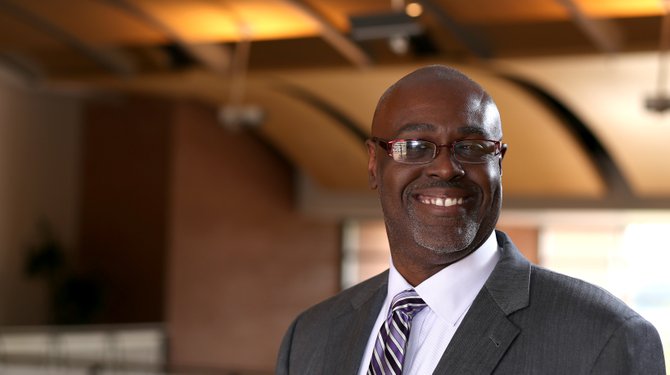Marino Bruce spends much of his time researching connections between physical health and the social environment.
Bruce's biggest question is: How can "social determinants" like race, age, exposure to discrimination, sex and neighborhood affect our mental and physical well-being? The answer is often not simple. Our social lives, as well as our health, are quite complex, but Bruce finds visible relationships between human interaction and overall health.
"The medical model breaks people down into their parts," Bruce said. "What I'm thinking of is along the other way. We're all part of a larger system, and if we begin to think that way—ways where human beings are connected to other people and to the community—then we might be able to improve overall health."
Bruce, 45, is originally from South Boston, Va., but moved to Jackson in 2010 to become a professor of criminal justice and sociology at Jackson State University.
Bruch also serves executive director of Faculty Development, Research, and Creative Expression at JSU. He holds a Ph.D. from North Carolina State University as well as a master's degree in rehabilitation counseling from Winston-Salem State University. Bruce is also an adjunct professor at the University of Mississippi Medical Center where researches the relationship between social factors and individual health.
Bruce's most recent studies consider how race, class and gender affect obesity and kidney disease, but his philosophy on personal health always comes back to how we interact with our community.
"It starts by how we process the world we're in," Bruce said. "If we can find ways to help people navigate the world they're in and feel better about themselves and their community, that will have a positive impact on their health for the long term."
Bruce's method is both medical and humanistic, looking into the individual and expanding into a how the larger community operates. It's an interdisciplinary approach to health research that's refreshing considering how health disparities can often reflect a community's economic disparities.
Bruce recently served as a volunteer staff counselor at the Jackson Medical Mall and won recognition for his efforts on Nov. 7 at the Community Reinvestment Awards as an "Outstanding Individual Honoree."
Bruce's best work may still be to come. As an ordained clergyman, he's been interested in connections between the mind and spirit for some time and plans on developing this research further in the future.
"I'm interested in looking at how the mind and spirit have implications for health, and how all these things work together," Bruce said. "Part of where I'm going is to examine areas where, if we improve certain social conditions, giving people a spiritual base, (doing so) may be able to help direct how our psychology functions and how we think."



Comments
Use the comment form below to begin a discussion about this content.